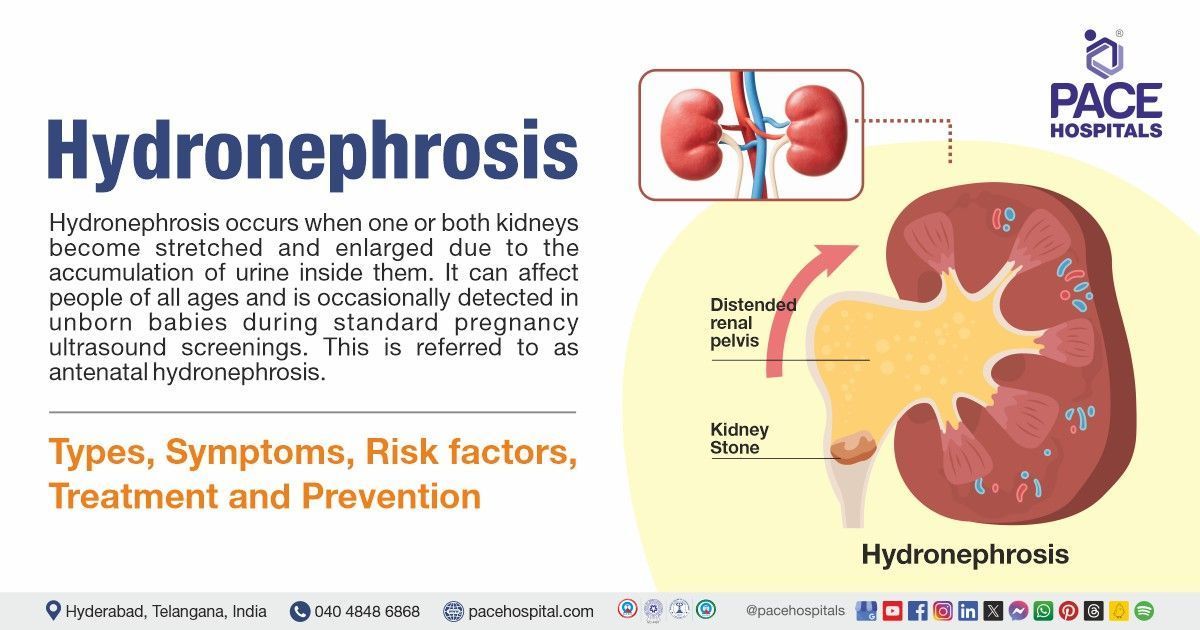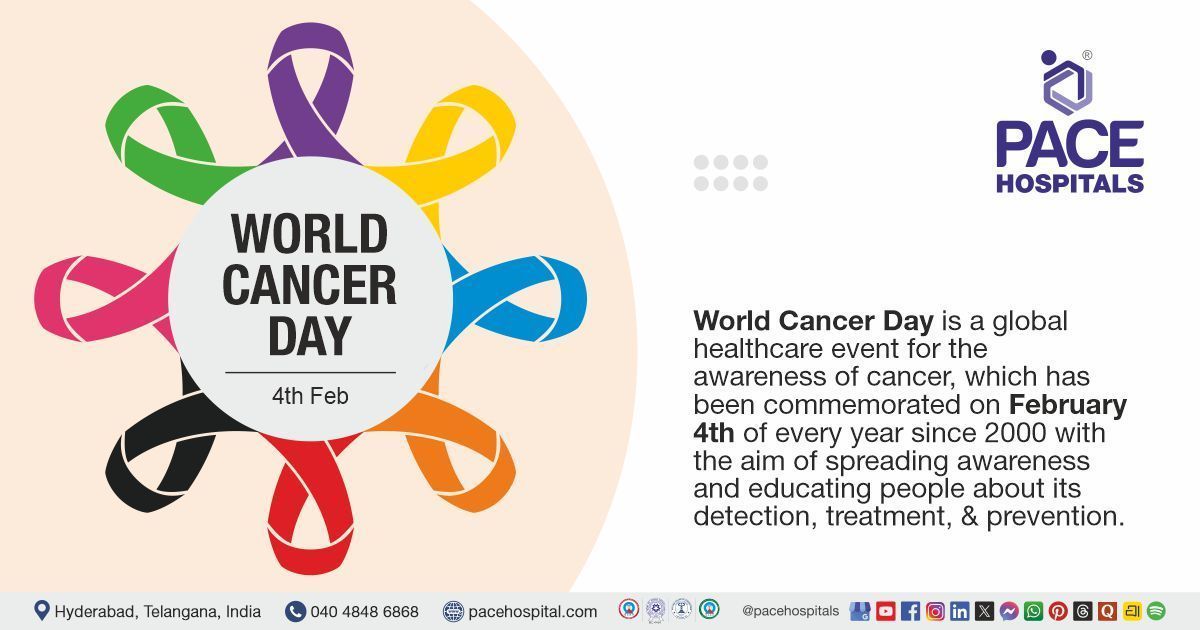Hydronephrosis - Symptoms, Causes, Complications, Treatment, Prevention
PACE Hospitals
Hydronephrosis definition
Hydronephrosis is characterized by the enlargement and stretching of one or both kidneys due to urine buildup within them. This condition can affect individuals across all age groups, and is occasionally detected in unborn babies during standard pregnancy ultrasound screenings, referred to as antenatal hydronephrosis. If hydronephrosis is identified early and treated appropriately by a
urologist/nephrologist, it usually does not result in any long-term issues.
Hydronephrosis meaning
The word hydronephrosis is a combination of the words
hydro and
nephrosis. It was first recorded between 1840–50. Hydronephrosis is a radiology term that refers to swelling or fluid in the kidney, caused by a buildup of urine that results from an obstruction of normal outflow.
Prevalence of hydronephrosis
worldwide
Every year, an estimated 6% of all new births (80 lakhs) are born with significant birth defects, with up to 1% having kidney and urinary tract congenital disorders. Hydronephrosis is becoming more common in neonates and infants, and it is usually caused by ureteropelvic junction blockage.
Hydronephrosis occurs in up to 80% of pregnant women. Mechanical compression of the ureters caused by the expanding uterus, as well as the effects of progesterone, are likely to be the cause. It is usually detected in the second trimester and might last for 6 to 12 weeks after birth. If patients suffer discomfort and renal failure, ureteral stenting is the preferred therapy option.
Hydronephrosis is more common in women aged 20 to 60 because of pregnancy and gynaecologic malignancy. Men over the age of 60 are more likely to develop hydronephrosis due to prostate disease and its consequences.
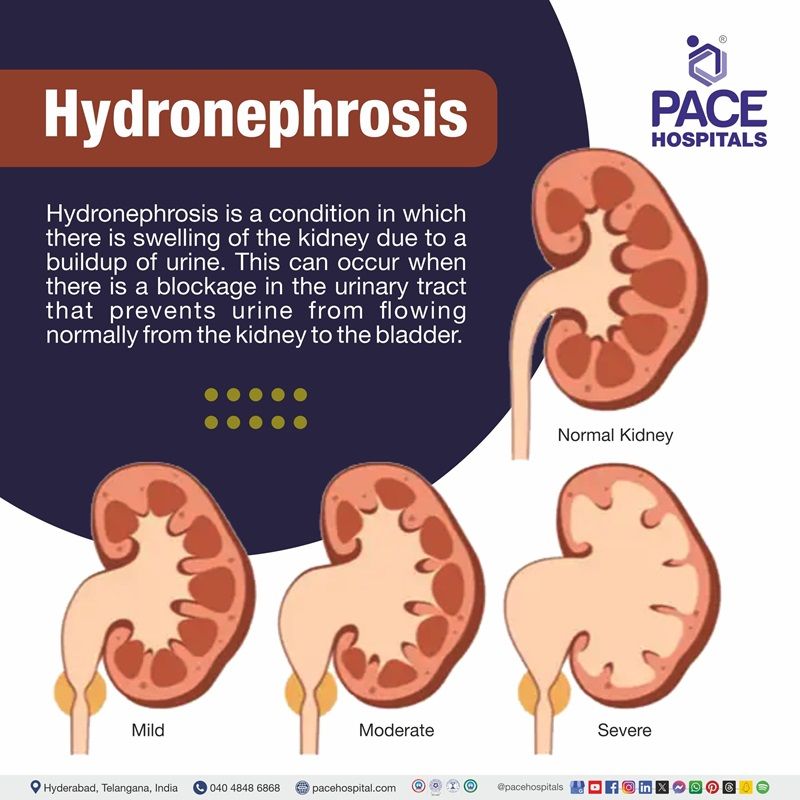
Types of hydronephrosis
Different kinds of hydronephrosis exist depending on different aspects which include:
Based on the cause, hydronephrosis is categorized into
- Congenital hydronephrosis: Congenital hydronephrosis is a disorder that is present by birth and causes urine to build up in a child's kidneys.
- Acquired hydronephrosis: Acquired hydronephrosis is caused by an incident or disease process that occurs after birth, such as a kidney stone that blocks the flow of urine or an external mass squeezing the urine tube.
Based on severity, hydronephrosis is categorized into
- Mild hydronephrosis: The medical term mild indicates that the illness is not severe. Mild hydronephrosis is typically regarded as a benign and reasonably self-limiting illness that stabilizes or resolves spontaneously in most individuals.
- Moderate hydronephrosis: Moderate hydronephrosis is characterized by enlargement of the kidney's pelvis and calyces.
- Severe or gross hydronephrosis: If severe or gross hydronephrosis is not treated, it may lead to kidney damage or possibly renal failure.
Based on laterality, hydronephrosis is categorized into
- Unilateral (single kidney) hydronephrosis: Unilateral hydronephrosis involves swelling of only one kidney as a result of a urine accumulation.
- Bilateral (both kidneys) hydronephrosis: In bilateral hydronephrosis, both kidneys are swelled due to urine accumulation
Based on the level of obstruction, hydronephrosis can be categorized into
- Complete hydronephrosis: Complete hydronephrosis refers to the complete blockage of the ureters
- Partial hydronephrosis: Partial hydronephrosis refers to the partial blockage of the ureters
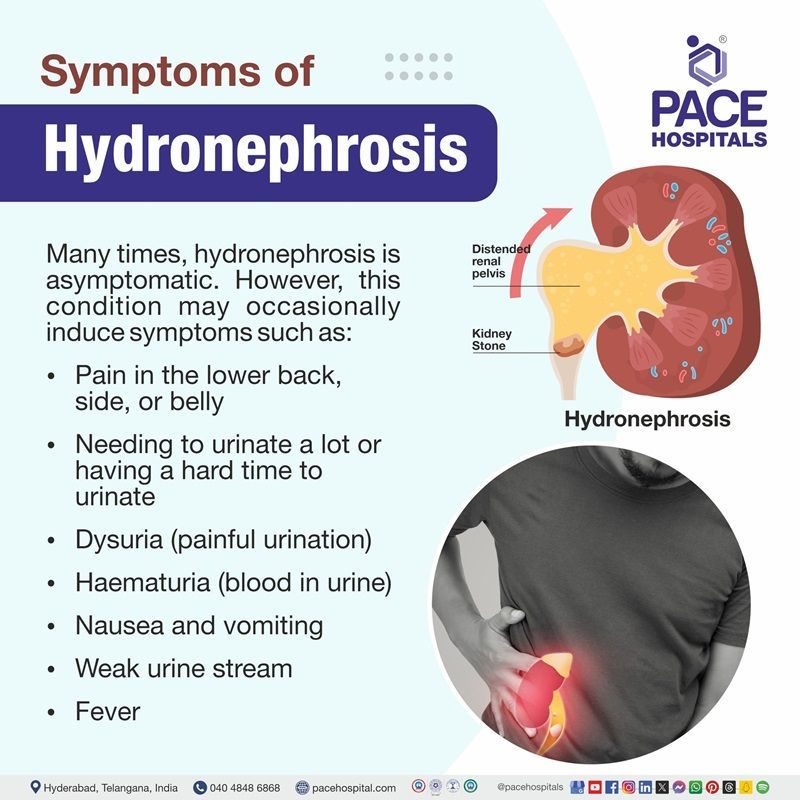
Hydronephrosis symptoms
The symptoms of hydronephrosis can vary depending on the severity and underlying cause of the condition. Many times, hydronephrosis is asymptomatic, some people with hydronephrosis may not experience any symptoms at all, while others may experience a range of symptoms:
- Pain in the lower back, side, or belly
- Needing to urinate a lot or having a hard time to urinate
- Urinary tract infection
- Dysuria (painful urination)
- Haematuria (blood in urine)
- Nausea and vomiting
- Weak urine stream
- Fever
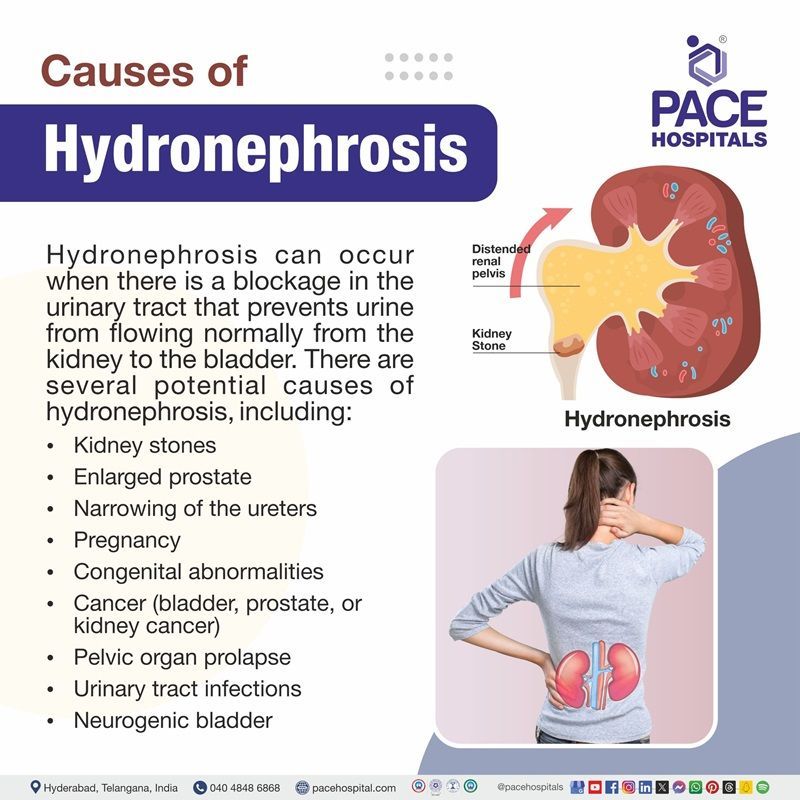
Hydronephrosis causes
Since hydronephrosis can affect people regardless of their age, the causes in adults and newborns differ accordingly:
Hydronephrosis causes in adults
Unlike in pediatric patients, where congenital causes are commonly dominant, the causes of hydronephrosis in adults are frequently a combination of acquired conditions and lifestyle factors.
The common causes of hydronephrosis in adults include:
- Kidney stones (renal calculi): Tiny kidney stones that form in the kidneys sometimes travel out of the kidneys and gets accumulate in the ureters causing ureter blockage. This blockage may cause hydronephrosis.
- Benign prostatic hyperplasia (prostate enlargement): Benign prostatic hyperplasia (BPH), generally known as an enlarged prostate, can induce hydronephrosis by blocking urine flow. Urine outflow gradually becomes stopped as the prostate narrows and lengthens the urethra. This can cause increased pressure in the bladder and during urination, damaging the bladder and making it difficult to empty the bladder completely. When the bladder fails to empty completely, urine can back up into the kidneys, causing them to enlarge. This is known as hydronephrosis.
- Vesicoureteric reflux is a condition in which urine flows backwards into the ureters and kidneys from the bladder. It is most commonly seen in infants and young children, although it can also occur in older children and adults. Primary vesicoureteral reflux is genetic disposition and more common in children, whereas secondary vesicoureteral reflux is caused by blockage or bladder muscle failure or damage to the nerves that control normal bladder emptying due to kidney stones or an enlarged prostate or cancer. It is often diagnosed after a urinary tract infection (UTI), as UTIs are more common in people with vesicoureteral or vesicoureteric reflux (VUR).
- Pregnancy: During pregnancy, the enlarged womb (uterus) can sometimes induce pressure on the ureters leading to hydronephrosis.
- Urinary tract infections: Infections in the urinary tract can cause swelling and inflammation, which can lead to a blockage and hydronephrosis.
- Narrowing of the ureters: Sometimes ureters can become narrowed due to trauma, injury, and certain surgeries. Ureter narrowing can cause hydronephrosis.
- Pelvic organ prolapse: Pelvic organ prolapse (POP) can result in hydronephrosis, which can harm the kidneys by putting pressure on them. Pelvic organ prolapse develops when the pelvic floor muscles and ligaments degenerate, resulting in inadequate support for the uterus, bladder, and rectum. This can cause the bladder, uterus, and ureters to herniate through the pelvic floor, squeezing the ureters between the bladder and uterus. This compression is believed to be the precise mechanism that produces hydronephrosis in pelvic organ prolapse.
- Neurogenic bladder: Hydronephrosis can occur as a complication in patients with neurogenic bladder. Difficulties with the bladder are caused by illnesses or injuries to the central nervous system or peripheral nerves that regulate urine.
- Malignancy (cancers) in or around the urinary tract: Cancers such as bladder cancer, kidney cancer, prostate cancer, cervical cancer, ovarian cancer, or womb cancer can cause hydronephrosis by ureteral obstruction or compression.
- Ureteropelvic junction (UPJ) stenosis
- Ureteral stricture
- Simple or complex renal cysts
- Posterior Urethral Valves (PUV)
- Peripelvic renal cysts
- Retrocaval ureter (preureteric vena cava or circumcaval ureter)
- Retroperitoneal fibrosis (Ormond's disease)
- Prostatic abscess
Causes of hydronephrosis in infants / newborn
Addressing the underlying etiology (cause) of hydronephrosis in pediatric patients is essential for proper diagnosis, treatment, and prevention. Unlike in adults, where hydronephrosis is commonly caused due to kidney stones, or enlarged prostate, children may develop this condition due to a variety of congenital (A medical condition or trait that exists from birth) and acquired causes.
It is quite unclear why hydronephrosis occurs in newborn babies. It is thought to be caused by an increase in the amount of urine generated by the baby in the late stages of pregnancy. In some instances, it can be caused by:
- Transient dilatation: The ureters become relaxed due to pregnancy hormones, however, this usually goes away after the baby is delivered.
- Vesicoureteral reflux: When the failure of the valve that regulates the passage of urine between the ureters and the bladder causes the urine to return to the kidneys.
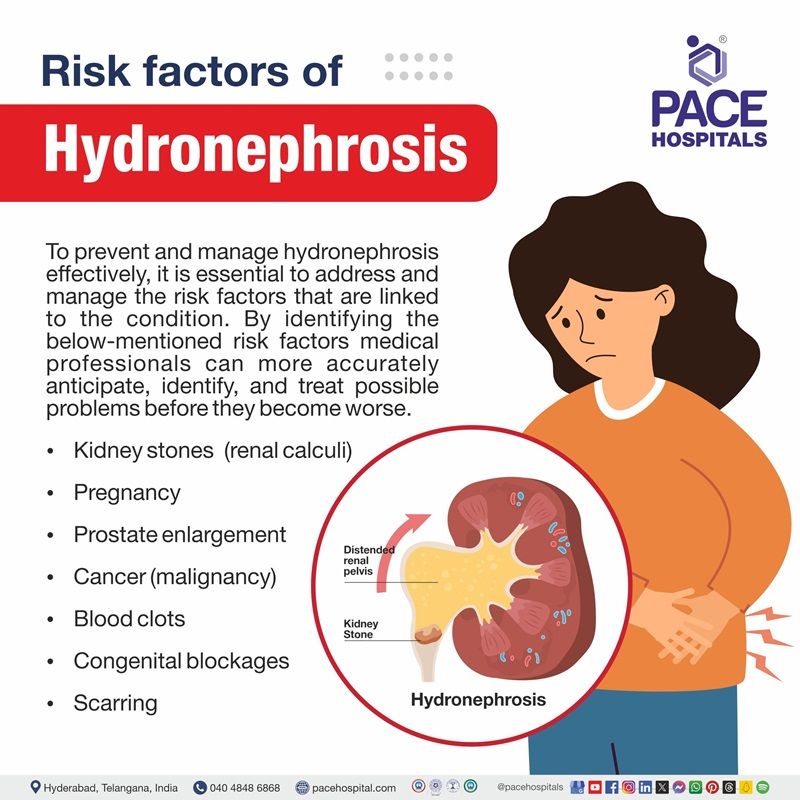
Hydronephrosis risk factors
To prevent and manage hydronephrosis effectively, it is essential to address and manage the risk factors that are linked to the condition. By identifying the below-mentioned risk factors, an urologist or nephrologist can more accurately anticipate, identify, and treat possible problems before they become worse. There are several risk factors that can increase a person's likelihood of developing hydronephrosis. These include:
- Kidney stones (renal calculi): Tiny kidney stones that can occasionally pass through a kidney and obstruct the ureters, leading to hydronephrosis
- Pregnancy: The dilatation of the uterus often occurs in the second trimester as the fetus grows. The cause is usually believed to be mechanical compression of the ureter between the iliopsoas muscle (a muscle that helps the hip joint rotate externally) and the gravid (pregnant) uterus.
- Prostate enlargement: BPH is a non-cancerous enlargement of the prostate gland that can cause urinary blockage. This can lead to an accumulation of urine in the bladder and pressure on the ureter, resulting in hydronephrosis.
- Cancer (malignancy): Certain types of cancers may increase the risk of developing Hydronephrosis. Research studies have demonstrated that hydronephrosis is a common consequence of cervical cancer and is associated with a poorer prognosis.
- Blood clots: Blood clots in the kidney or ureter can induce hydronephrosis by preventing urine flow.
- Congenital abnormalities: It usually occurs while an infant is still growing in the womb. This is known as a congenital condition (existing since birth). The most common cause of blockage is a narrowing of the ureter-renal pelvis junction. This causes urine to accumulate, affecting the kidney.
- Scarring: Scarring from infections, surgeries, or radiation treatments can induce hydronephrosis, which is a disorder that leads to swelling and scarring in the kidneys.
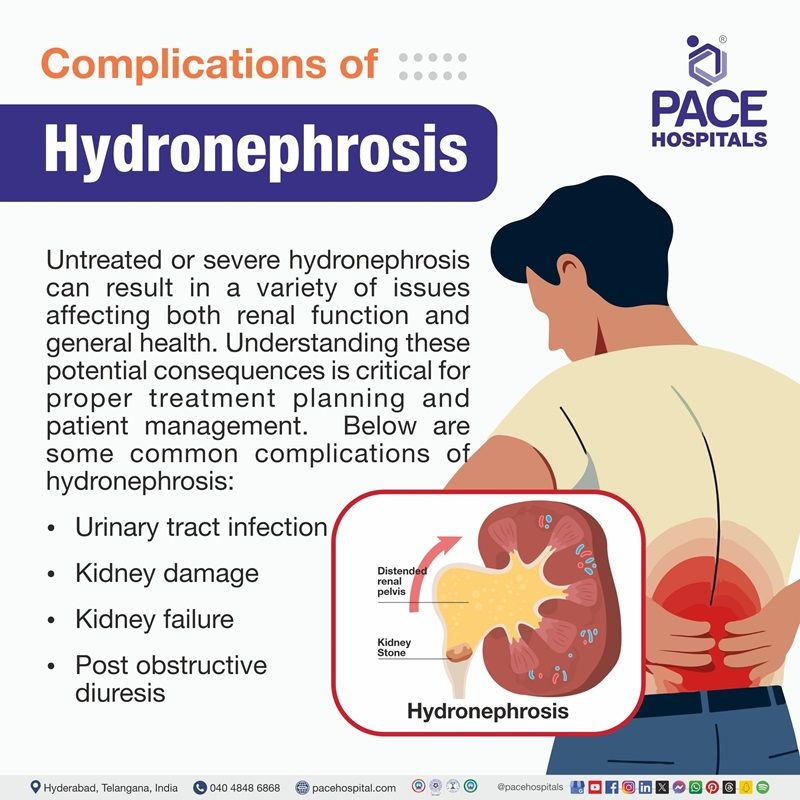
Complications of hydronephrosis
Untreated or severe hydronephrosis can result in a variety of issues affecting both renal function and general health. Understanding these potential consequences is critical for proper treatment planning and patient management. Below are some common complications of hydronephrosis:
- Urinary tract infection
- Kidney damage
- Kidney failure
- Post obstructive diuresis
Urinary tract infections (UTIs) - Urinary tract infections (UTIs) are the most prevalent complication of hydronephrosis and can cause pyelonephritis, a kidney infection.
Kidney damage - If not resolved, hydronephrosis might irreversibly damage the affected kidney.
Kidney failure - In severe situations, hydronephrosis can result in renal failure, necessitating dialysis or a transplant. However, renal failure is uncommon when the second kidney is functioning normally.
Post obstructive diuresis - Patients may experience a significant amount of urine release after a urinary tract obstruction is relieved.
Diagnosis of hydronephrosis
Patient after consulting a general physician about the symptoms, the general physician might refer the patient to a urologist or a nephrologist who is an expert in dealing with diseases and disorders related to the kidneys and urinary tract.
The nephrologist/ urologist diagnoses hydronephrosis by:
- Taking patient history
- Physical examination - Rectal examination, Pelvic examination
- Blood tests - Complete blood picture, Blood urea nitrogen (BUN)
- Urine tests - Urinalysis, Urine culture
- Imaging tests - Computed tomography (CT), Magnetic resonance imaging (MRI), Renal nuclear scan, Intravenous pyelogram (IVP), Ultrasound of the kidney, abdomen, or pelvis
- Cystoscope
Hydronephrosis treatment
The goal of treatment is to restore urine flow from the kidney and reduce oedema (swelling due to fluid accumulation) and pressure caused by fluid buildup. If the hydronephrosis is acute or unexpected, a stent or soft tube (nephrostomy tube) can be placed into the kidney to remove excess urine.
Treatment options vary based on the underlying cause of the problem. A nephrologist/ urologist manages hydronephrosis by:
- Medical management of hydronephrosis
- Minimally invasive procedures
- Surgical management of hydronephrosis
- Medical management of hydronephrosis - Antibiotics, Analgesics
- Minimally invasive procedures - Ureteroscopy, Shock wave lithotripsy
- Surgical management of hydronephrosis - Kidney stones that are extremely large or difficult to remove may require surgical removal. Surgery may also be required for tumours or other sorts of blockages.
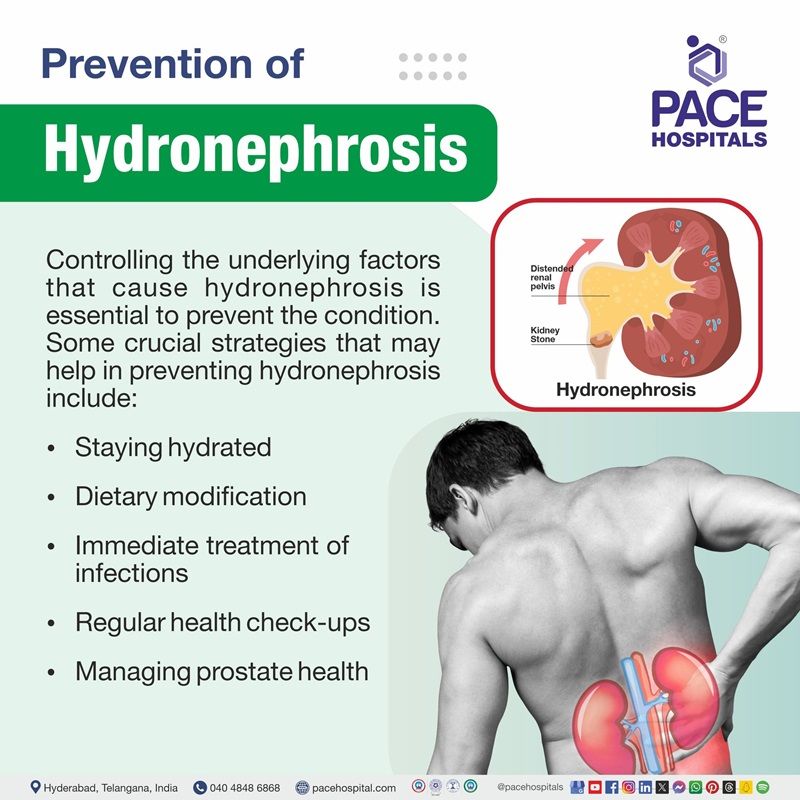
Prevention of hydronephrosis
Controlling the underlying factors that cause hydronephrosis is essential to prevent the condition. Some crucial strategies that may help in preventing hydronephrosis include:
- Staying hydrated: As kidney stones are a prevalent cause of hydronephrosis, drinking plenty of water helps to prevent them.
- Dietary modification: Lowering protein and salt consumption can help avoid kidney stones and other urinary tract problems.
- Immediate treatment of infections: Promptly treating urinary tract infections (UTIs) can stop them from creating obstructions in the ureters that result in hydronephrosis.
- Regular health check-ups: Regular medical check-ups can help identify and address problems early in life for those with a history of kidney stones or other urinary tract difficulties.
- Managing prostate health: Men who take care of their prostate health can avoid obstructions brought on by an enlarged prostate.
Although hydronephrosis cannot be prevented owing to congenital factors, there are steps that one may take to control and lower the chance of acquiring the condition as a result of other causes.
Difference between hydronephrosis and pyelonephritis
Hydronephrosis vs pyelonephritis
The urinary tract can be affected by both pyelonephritis and hydronephrosis, however their causes and symptoms differ. The table below contains the major differences between hydronephrosis and pyelonephritis:
| Feature | Hydronephrosis | Pyelonephritis |
|---|---|---|
| Definition | Swelling of a kidney due to a build-up of urine | Bacterial infection of the kidney and renal pelvis |
| Causes | Obstruction in the urinary tract (e.g., kidney stones, tumors) | Bacterial infection, often ascending from the bladder |
| Symptoms | Flank pain, nausea, vomiting, urinary frequency, and urgency | Flank pain, fever, chills, nausea, vomiting, dysuria (pain full urination) |
| Diagnosis | Ultrasound, CT scan, MRI | Urinalysis, urine culture, blood tests, imaging if needed |
| Treatment | Relieving the obstruction (e.g., surgery, stent) | Antibiotics, hospitalization in severe cases |
| Complications | Kidney damage, infection | Sepsis, kidney abscess, chronic kidney disease |
| Prognosis | Good if treated early | Good with prompt antibiotic treatment |
Frequently Asked Questions (FAQs) on hydronephrosis
What is the main cause of hydronephrosis?
The most common causes of hydronephrosis are obstructions in the urinary tract or diseases that interfere with the normal function of the urinary tract. Kidney swelling may result from this if the urine backs up or flows in the wrong direction.
What is the best treatment for hydronephrosis?
Urinary catheterization is the procedure most persons with hydronephrosis will have to undertake to drain their kidneys accumulated with urine. The problem may then need to be fixed with medicine or surgery, depending on the underlying cause.
Is hydronephrosis a serious condition?
The severity of hydronephrosis might vary. Moderate cases might not impose much risk, but severe or prolonged hydronephrosis might cause major kidney damage or other health issues.
Can prenatal (before birth) hydronephrosis recur after treatment?
With conservative therapy, most cases of prenatal hydronephrosis tend to resolve on their own. However, late recurrence of prenatal hydronephrosis might occur following improvement. After prenatal hydronephrosis has been treated, no long-term follow-up is required. However, pediatric urologists may inform the parents that their kid should undergo ultrasonography if clinical signs occur.
How is the severity of hydronephrosis assessed?
The severity of hydronephrosis is evaluated using the Society for Fetal Urology (SFU) grading system, which is described as Grade 0: No hydronephrosis and intact central renal complex observed on ultrasonography.
- Grade 1: just renal pelvis visualized, dilated pelvis on ultrasonography, no caliectasis (swelling of calyces in the kidneys).
- Grade 2: Moderately dilated renal pelvis with a few calyces.
- Grade 3: Hydronephrosis with nearly all calyces visible, big renal pelvis without parenchymal thinning.
- Grade 4: Severe dilatation of renal pelvis and calyces, accompanied by parenchymal atrophy or thinning
Is hydronephrosis cancerous?
Hydronephrosis is not a type of cancer itself, but it can potentially be caused by cancer. Certain types of cancer, such as bladder, prostate, or kidney cancer, can cause a blockage in the urinary tract and lead to hydronephrosis. In these cases, the hydronephrosis is not cancerous itself, but it is a sign of an underlying cancerous process.
It is important to note that not all cases of hydronephrosis are caused by cancer. Other potential causes of hydronephrosis include congenital abnormalities, kidney stones, enlarged prostate, pregnancy, and infections.
Is hydronephrosis a disability?
Whether or not hydronephrosis is considered a disability depends on the severity of the condition and how it affects a person's daily life. In some cases, hydronephrosis may not cause any significant symptoms or problems and may not be considered a disability. However, if hydronephrosis is severe or persistent, it can lead to complications such as kidney damage, urinary tract infections, and kidney stones. These complications can potentially impact a person's ability to perform certain activities and may be considered a disability in some cases.
It is important to note that the definition of disability and the process for determining whether a person is considered disabled can vary depending on the context.
Can hydronephrosis cause constipation?
There is some research to suggest that hydronephrosis may be associated with constipation, although the exact relationship between the two is not fully understood. Hydronephrosis is a condition in which there is swelling of the kidney due to a buildup of urine, whereas constipation is a condition in which a person has difficulty passing stools or has infrequent bowel movements. There are many potential causes of constipation, including certain medications, dietary factors, and underlying medical conditions.
It is possible that the swelling and pressure in the abdomen caused by hydronephrosis may contribute to constipation by putting pressure on the intestines and making it more difficult for stools to pass. However, it is also possible that constipation and hydronephrosis may simply occur together by chance, as they are both common conditions.
Is hydronephrosis a chronic kidney disease?
Hydronephrosis is not a chronic kidney disease itself, but it can potentially lead to chronic kidney disease if it is not treated. If hydronephrosis is not treated, the buildup of urine in the kidney can cause damage to the kidney tissue and potentially lead to chronic kidney disease. Chronic kidney disease is a condition in which the kidneys gradually lose their ability to function properly over time. It can cause a range of symptoms and complications, including high blood pressure, anemia, and bone disease.
It is important to note that not all cases of hydronephrosis will lead to chronic kidney disease. The risk of developing chronic kidney disease depends on the severity and duration of the hydronephrosis, as well as any underlying medical conditions.
What is the pathophysiology of hydronephrosis?
Hydronephrosis can be caused by anatomical or functional factors that disrupt the flow of urine. This interruption can take place anywhere along the urinary tract, from the kidneys to the urethral meatus (opening at the end of the urethra). Increased ureteral pressure causes significant alterations in glomerular filtration, tubular function, and renal blood flow.
Does mild hydronephrosis need treatment?
The need for treatment for mild hydronephrosis depends on the underlying cause of the condition and the potential risks of complications. Mild hydronephrosis is a condition in which there is some swelling of the kidney due to a buildup of urine, but the swelling is not severe.
However, if the underlying cause of the mild hydronephrosis is a blockage in the urinary tract, it is important to address the blockage to prevent potential complications such as kidney damage, urinary tract infections, and kidney stones. Treatment for the blockage may involve surgery or other procedures to remove or bypass the blockage.
In some cases, mild hydronephrosis may be due to a temporary or reversible cause, such as a kidney stone that has passed or an infection that has been treated. In these cases, the mild hydronephrosis may resolve on its own without treatment.
What is the most common complication of hydronephrosis?
The most frequent side effect of hydronephrosis is urinary tract infection. It may also result in kidney infection or pyelonephritis. Patients may experience post-obstructive diuresis (a significant amount of urine released after a urinary tract obstruction is relieved).
Does drinking water help hydronephrosis?
In general, drinking plenty of water is beneficial to kidney health since it helps avoid and wash away kidney stones. However, drinking too much water might be harmful, especially if the patient can't quickly urinate. Certain kidney diseases, such as hydronephrosis, can impair the capacity to completely empty the bladder. In fact, one study discovered that rapidly drinking high volumes of water could contribute to hydronephrosis. However, further research is needed to determine this.
Can hydronephrosis be asymptomatic?
Yes, hydronephrosis can occasionally present with no symptoms, especially if it progresses slowly. Imaging studies performed for other purposes may be the sole way for some people to learn they have the illness.
How can hydronephrosis affect kidney function over time?
Chronic hydronephrosis can cause gradual kidney injury and reduction in renal function. Long-term pressure and stretching on the kidney tissue can decrease its ability to filter blood efficiently.
How is hydronephrosis diagnosed in pregnant women?
Hydronephrosis is frequently found during pregnancy with routine ultrasounds, which are commonly used to monitor fetal development. Treatment usually focuses on addressing the underlying problem and ensuring maternal and fetal health.
Does hydronephrosis cause frequent urination?
Frequent urination can be a symptom of hydronephrosis, although not everyone with hydronephrosis will experience this symptom. If the blockage is significant due to hydronephrosis, it can cause urine to back up into the kidney and potentially lead to swelling and damage to the kidney tissue. In some cases, this can cause pressure to build up in the bladder, leading to a frequent or urgent need to urinate.
However, it is important to note that frequent urination can be caused by a variety of factors, and not all cases of frequent urination are due to hydronephrosis. Other potential causes of frequent urination include urinary tract infections, diabetes, pregnancy, and certain medications.
Share on
Request an appointment
Fill in the appointment form or call us instantly to book a confirmed appointment with our super specialist at 04048486868
Appointment request - health articles
Recent Articles


